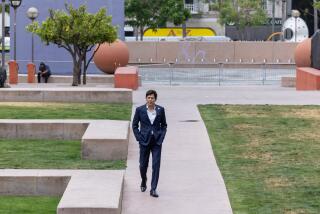Library Reappraises Exhibit on Convicted Councilman
- Share via
LONG BEACH — A public library exhibit honoring the city’s first black councilman, the late James H. Wilson, is assuming on-and-off status as local library officials reappraise their plans to pay homage to a man who was both a popular politician and a convicted felon.
A permanent display of mementos from Wilson’s 16 years in office was being hung last week in the auditorium at the Burnett Branch Library on Hill Street, in Wilson’s old district. “Councilman Wilson was always a friend of the library when he was in office, so I think it’s important not to have his things just boxed away,” explained Marcia Bennett, the branch librarian.
But after inquiries by The Times, library officials say they are taking down the exhibit. Depending on community reaction to the display proposal, the library may later reinstall it, said Doris Soriano, who oversees the branch libraries.
Wilson’s 1986 conviction for mail fraud and subsequent resignation from the City Council is common knowledge. But library officials say they received no complaints about the display when they announced a small reception they had planned this week to mark the opening of the permanent exhibition of photographs, plaques, resolutions and awards.
“What can I say about it,” Bennett said when questioned about Wilson’s conviction. “He was the first black councilman in Long Beach. I think he was a credit to his community. He worked hard as a councilman. I guess he was human.” No mention of Wilson’s legal difficulties was included in the display.
Wilson died of a heart attack at age 58, a few weeks after he was sentenced to three years in prison for accepting some $54,000 in hidden payments between 1978 and 1983 from fireworks manufacturer and convicted political fixer W. Patrick Moriarty. Moriarty testified at Wilson’s trial that he had hired Wilson as his personal consultant for $500 a month and later $1,500 a month and used the lawmaker’s services to lobby for fireworks legislation and to introduce him to public officials.
Wilson received the money in the mail from firms in which Moriarty had an interest. Wilson, who was appealing his conviction at the time of his death, said he had always favored legalizing safe fireworks and had never accepted anything from anyone to introduce pro-fireworks legislation in his community.
Several local political leaders said they thought Wilson’s political achievements should be recognized despite his conviction.
“No one would be convicted of such a charge now,” contended Frank Berry, head of the local chapter of the NAACP and a friend and supporter of Wilson. “To have all the good things he did for so long put out of the public’s eye is very unfortunate and very unfair.”
A mail fraud conviction of former Assemblyman Bruce E. Young--another politician prosecuted in the Moriarty scandal on charges similar to Wilson’s--was overturned in 1988 when a federal appeals court concluded that the conviction was based on an overly broad definition of mail fraud. However, that same year Congress added new language to the mail fraud statute, writing into the law the mail fraud definition that was used to prosecute Young and Wilson.
More to Read
Sign up for Essential California
The most important California stories and recommendations in your inbox every morning.
You may occasionally receive promotional content from the Los Angeles Times.














